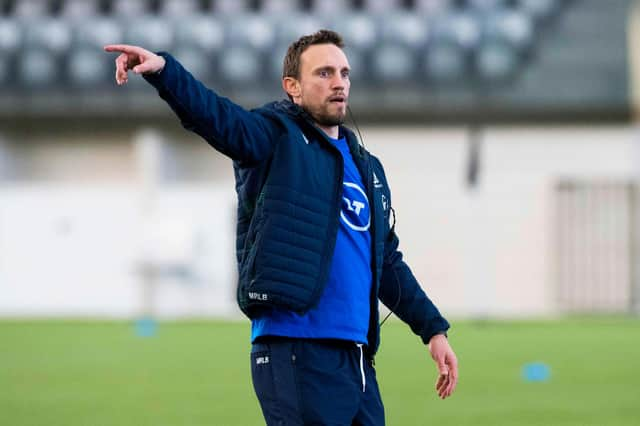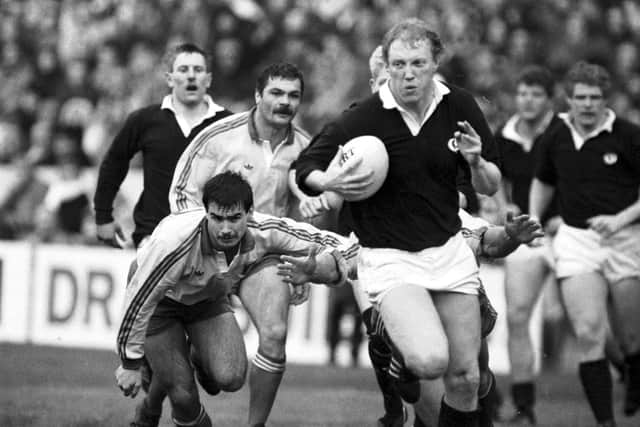Mike Blair was fast, adventurous and quick-thinking - let’s hope his Scotland team are the same


Matches against England A, Romania and Georgia can be nobody’s idea of easy, and it’s reasonable to say that the strongest XV that can be selected from the 37-man squad will feature perhaps only a handful of players who might be Townsend’s first choices for one of the autumn internationals or a Six Nations match: Jamie Ritchie, Matt Fagerson, Scott Cummings, Sam Skinner and George Turner, all in the pack.
There are others who have started internationals and will likely do so again: Blair Kinghorn, Matt Scott, Adam Hastings, George Horne and Magnus Bradbury, for example. The squad is missing not only our eight Lions, of course, but also established internationals – Sean Maitland, Darcy Graham, Sam Johnson, Fraser Brown, Stuart McInally, Jonny Gray, while Cameron Redpath, who made such an impression in his first game for Scotland at Twickenham before being injured and missing the rest of the Six Nations, is absent due to a serious knee issue. So there is pretty well a full first XV missing.
Advertisement
Hide AdAdvertisement
Hide AdThe challenge is formidable. England A can’t be anything but strong; there are so many good players to choose from. Then Romania and Georgia in the heat of July will be as physically demanding as can be.


Romania are the never-quite-made-its of European rugby. They are among sport’s few casualties of the fall of Communism. Back in the 1980s when our game was genuinely amateur, it was reasonable to regard the Romanians like many athletes in what we called “the Eastern bloc” as being State-sponsored. Many, perhaps even most, of their players were drawn from the army or the police, and it was suspected that their duties in these forces were light. Certainly they were powerful players. In a country of food queues they gave the impression of being fed on beef. And they were pretty good, almost certainly the best European team east or south of France.
Scotland went to play them in Bucharest in May 1984, and went there as Five Nations champions two months after beating France at Murrayfield and achieving our first Grand Slam since 1925. It wasn’t admittedly quite the team that beat France which ran out in Bucharest. Roger Baird, Colin Deans, Iain Milne, Jim Calder and Iain Paxton were missing. Nevertheless it was a formidable line-up: Peter Dods; Jim Pollock, Jim Renwick, David Johnston, Keith Robertson; John Rutherford, Roy Laidlaw; Jim Aitken, Gary Callander, Norrie Rowan, Alastair Campbell, Alan Tomes, David Leslie, Sean McGaughey, John Beattie.
Despite taking an early lead, with a try from David Leslie and then another from Peter Dods and leading 16-9 at half-time, we lost 22-28. There were extenuating circumstances: the temperature, even in May, was in the upper eighties and some of the team had been suffering from upset stomachs. The efficient Romanian pack dominated the second half, and we were fortunate that their backs weren’t really up to much. Romanian rugby has never been as strong again.
Nevertheless playing in Bucharest in high summer is demanding. The same may be said of matches in Tbilisi and indeed we all now have a pretty clear idea of Georgian rugby: love scrummaging, adore tackling, take no prisoners. There are always bruised bodies after a Georgian match. To some extent the heat that may expected is marginally less demanding than it was when Jim Aitken led his side out in 1984. This was long before the days of substitutes-at-will, replacements being permitted only for injured players. Now we can expect that only seven of a starting XV will be required to last the full 80 minutes. One may also remark that there are more rest moments during a match now when the TMO is being consulted and water-carriers hurry on to offer refreshment.
For some, this short tour may be a sort of last-chance saloon. Matt Scott has some fine international performances to his credit, but has been a rather forgotten man for a few years. Magnus Bradbury is still too often an if-only man, a formidable player who tends to drift out of matches. A couple of years ago you might have wagered on a settled Scotland back-row of Ritchie, Bradbury, Watson. You would have lost your money.
For many, a chief interest of these matches will be watching the really young players who in a couple of years may be regarded as established stars. They are mostly from Glasgow: Cole Forbes, Rufus McLean, Ross Thompson, Jamie Dobie.
Mike Blair was perhaps the fastest, most adventurous and quick-thinking Scotland scrum-half of this century. Let’s hope his team displays some of that character.
